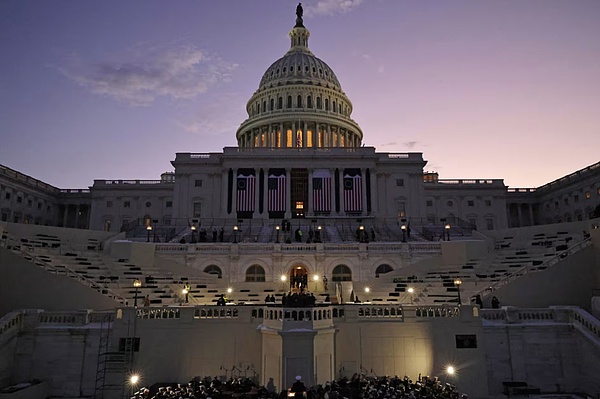
Source: Barron's Chinese
The subsequent trend of the stock market will depend on Trump's tax and fiscal policies, and the reaction of the 10-year U.S. Treasury yield to these.
The U.S. stock market rebounded strongly, driven by falling U.S. bond yields and lower-than-expected core inflation data.
The S&P 500 index rose 1.8% on Wednesday (January 15) to close at 5949 points, its largest single-day gain in 10 weeks. The Dow Jones Industrial Average rose 703 points, or 1.7%, to close at 43,221 points. The Nasdaq Composite rose 2.5%. All three major stock indexes posted their largest one-day percentage gains since Trump won the election.
Data released by the U.S. Bureau of Labor Statistics on Wednesday showed that the core CPI increase, excluding food and energy prices, fell back to 3.2% year-on-year in December 2024, once again igniting investors' expectations that the Federal Reserve will announce a policy change sometime this year. Expectations of interest rate cuts.
John Luke Tyner, head of fixed income business at Aptus Capital Advisors, commented: "We thought the stock market had been too pessimistic before, and the market's reaction today was As expected.”
New York Life. Investments' global market strategy team wrote in a report to clients on Wednesday: "The lower-than-expected inflation data is undoubtedly good news. Yields have fallen from their highs, and the market expects the Federal Reserve to cut interest rates in June."
However, there is a big question whether the current bullish sentiment can be sustained due to uncertainty about the impact of Trump's tariffs and tax cuts on the U.S. debt burden.
Tyner believes that if the S&P 500 rises to around 5,975 points, the stock market may encounter resistance.
The cooling of core inflation ignited expectations of interest rate cuts, and the three major stock indexes rose strongly Falling yields eased pressure on the stock marketThe benchmark 10-year U.S. Treasury yield fell sharply by 13.4 basis points on Wednesday to 4.653% , calming investors’ nervousness. The yield had risen to 4.802% the day before, the highest level since October 2023.
Recently, the 10-year U.S. Treasury yield once exceeded the 4.75% mark, and some Wall Street insiders believe that this may trigger a stock market correction.
Richard Steinberg, chief market strategist at Focus Partners Wealth, said of the fall in yields: "Investors have gained a breather. The market has been volatile over the past three weeks. They have You need to evaluate your asset allocation.”
The sharp rise in long-term interest rates once put pressure on the market: the gains in U.S. stocks after Trump’s victory were eroded, technology stocks with high valuations were suppressed, and cryptocurrencies were suppressed. The currency retreated sharply after setting a record.
The Federal Reserve has cut interest rates several times since September last year, but bond yields have still risen sharply.Meanwhile, the U.S. economy has continued to grow during this period, the labor market has remained strong, and investors are betting that the incoming Trump administration will likely keep inflation high.
These factors may prevent the Fed from further cutting interest rates in 2025. Rising yields have been a headache for growth stock investors, especially when stock valuations are high.
The follow-up trend of Trump’s tax and fiscal decisionsSteinberg’s team’s forecast for the S&P 500 to reach 6,500 points (or 9% return) by the end of this year has not changed, but he pointed out that as As investors begin to learn more about corporate taxes during Trump's second term, the S&P 500's gains will follow a stop-and-go pattern.
Trump recently posted on "Truth Social" that he would propose "a strong bill" on border issues, U.S. energy production and the expiring 2017 tax cuts. , the funds required by the bill will be made up by tariffs levied on others.
Lower corporate taxes could make current stock valuations look less expensive relative to earnings, especially if the Fed cuts interest rates further this year and long-term Treasury yields fall further. If borrowing costs are lowered.
However, if spending is not cut, tax cuts will further increase the already heavy debt burden in the United States. This factor may once again trigger a sell-off in the bond market and the "bond vigilantes" will return.
Steinberg said: "I think taxes are probably the biggest unknown factor facing the market right now. What will be the fiscal and tax impact? How will the 10-year U.S. Treasury yield react? These The problem will determine the subsequent trend of the stock market”










